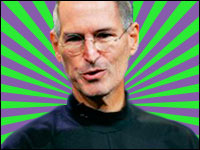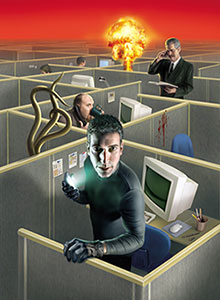
Two books came out last week: Idea Man, about (and by) Paul Allen; and The Steve Jobs Way, about (but not by) Steve Jobs. These books reveal differences in the approaches the two men took to achieving their goals, showcasing why Apple is so successful and why other companies just can’t make the grade.
I think by looking at these two men, we can gain insights on a lot of things: why Apple may not be successful after Jobs departs; the problems brewing at Google; the difficulties Microsoft has had competing in the consumer electronics space; RIM’s likely PlayBook failure; and HP’s CE issues.
There is a sharp contrast between what Jobs does and what everyone else does. These two men likely are one of the best examples of polar opposites, given that Microsoft would have failed had Paul Allen stayed, and Apple nearly failed because Steve Jobs left. I’ll explore that this week.
My product of the week is The Atrocity Archives book series, which places — I kid you not — a programmer as the hero and, eventually, the iPhone as his wand. So much better for adults than fricken Harry Potter.
Paul Allen’s Approach
Paul Allen isn’t dissimilar to many who start successful companies. He had a great idea, and he pulled in Bill Gates to execute it. In the early years, he contributed a bit to the company, but most of what he did could have been done by others. The increase in wealth coupled with distractions — largely connected to the increasing wealth, but unfortunately, in Paul’s case, a possibly fatal illness — tend to pull successful founders away from their original business focus toward other things.
Over time, these executives get farther and farther removed from the products, from the end-users of their products, from the problems with their employees, and from their market. They increasingly fill their time with meetings, investor events, and hanging out with other top executives. Because they have a high title and are very wealthy (on paper), they increasingly feel they can pick and choose what jobs they do.
For the most part, that was Paul. I actually engaged with him for a short time on a Vulcan Ventures PC project called the FlipStart and was incredibly underwhelmed. The idea was actually a good one and could have led to an iPhone- like product. His execution was horrid, as he had the group in dreary rainy Washington state, and he often observed from his yacht parked off some tropical island.
On top of that, he hired a bunch of people to build a hardware product who had never developed a hardware product before. They were smart; they were also completely unqualified for the effort. There was virtually no chance it would succeed, and it didn’t, but the problem started at the top.
Paul had great ideas. He had a wonderful wireless product — I had one — long before WiFi or 3G, but he buried it. Currently, he has been reduced to suing to protect the intellectual property he acquired because he hasn’t been able to capitalize on any of it. Now he is reduced to cowriting an autobiography that takes shots at Bill Gates — a guy who did execute.
The thing is that Paul isn’t that different from what we would see if we looked in most companies today — like Google or Microsoft — in terms of folks who are busy but not executing, who have so much wealth it has become a distraction.
Steve Jobs’ Approach
Now let’s contrast this with Steve Jobs. While he initially had some of the same problems that Paul Allen had, getting fired from Apple forced him down a different path. He always was an obsessive-compulsive type and that made him a micro-manager. Steve may not stay that connected to customers, and he does have the elitist problem that seems common with CEOs, but he takes each product as his own, and there isn’t a part of it he doesn’t touch.
You can see the difference between products he cares about, like the iPod, and products he doesn’t, like Apple TV. Apple TV gives you a sense of what Apple would be like without Jobs, because it was executed without Steve Jobs’ direct oversight or interest. Steve Jobs doesn’t care about or watch TV.
What makes Steve different is his passion for the product, and this passion cuts through his personal interests — including his jet and rebuilding his home. He isn’t really that interested in meeting with investors, and he stays connected with his people, because he wants to make sure the products he creates, which are like his children, are successful.
His personal measurement of success, while it has drifted to wealth a couple of times with near disastrous outcomes, generally is how well his products do in market, and he is obsessive about this success.
Ironically, while Steve often gets credit for the entire product, the ideas generally aren’t his initially. Once he starts on the path, though, he ensures execution. Allen had far more ideas but no one to ensure execution, and you kind of have to wonder what would have happened differently if Jobs and Allen had partnered with each other rather than with Wozniak and Gates.
Of course, Wozniak had similar execution problems, and the idea for Apple was mostly his. You kind of wonder what kind of train wreck would have resulted from a Wozniak and Allen partnership, and I’m pretty sure Gates and Jobs would have killed each other.
Wrapping Up: Sour Grapes
One thing that really bugs me personally is the retelling of the story about Gates and Ballmer conspiring to reduce Allen’s shares, because I believe I know what actually happened, having heard that story decades ago.
The issue was Paul was thought to be terminal, and he had enough shares so that his death might have forced Microsoft to dissolve if his heirs wanted cash. Having been in similar corporate decisions myself and having watched how companies can come apart if this isn’t considered and prevented, it is my belief that Ballmer and Gates were required to explore this topic.
They were both young and new to their jobs, and they were uncomfortable discussing the topic with Allen because he was so ill. That was a mistake, but one I have seen before. It’s typically made not because anyone is being dishonest, but because of the discomfort surrounding the topic.
Anyway, without Paul Allen, there wouldn’t be a Microsoft, and without Steve Wozniak, there wouldn’t be an Apple — but had either stayed with their companies and remained in power, they would have killed them.
Understanding why Gates and Jobs were vastly more capable goes to how both men are driven, and the problems with both companies can be tied to the loss of that drive and speak to problems now occurring at Google and Microsoft — and anticipated at Apple, once Jobs leaves permanently.
It is worth thinking about, because I think the cause of these problems can be prevented — but only if they are acknowledged and addressed. Great ideas are a buck a dozen, but people who can execute them are exceedingly rare.
Product of the Week: The Atrocity Archives or What if Bill Gates Were a Wizard?
 While I love the Harry Potter movies, they frustrate me. At any point, a sniper could likely take out Voldemort, and it seems clear that there would be a number of government agencies interested in doing so. In addition, I’m a Muggle, which translated seems to mean idiot, because we can’t seem to find our weapons to protect ourselves; we just run and hide in the Potter stories.
While I love the Harry Potter movies, they frustrate me. At any point, a sniper could likely take out Voldemort, and it seems clear that there would be a number of government agencies interested in doing so. In addition, I’m a Muggle, which translated seems to mean idiot, because we can’t seem to find our weapons to protect ourselves; we just run and hide in the Potter stories.

This is why I fell in love with The Atrocity Archives series by Charles Stross. His hero, Bob Howard, works for one of these agencies, carries a gun from time to time (granted with special rounds), and — wait for it — he is a programmer.
In these books, magic is code, and if you are great at code, then you are effectively a great magician. Your tools are PCs, and at times, smartphones and PDAs. Howard escapes with the help of a Windows Media Center PC, takes shots at Windows Vista, and has iPhone lust, which gets him into a certain amount of trouble despite the fact the iPhone helps save his life.
This hero operates in what sounds like a typical British bureaucracy, which means he has to generally fly coach, and the doesn’t get an Austin Martin. He does get a Smart car, which is too small for an ejector seat so the car ejects itself — granted, that is pushing it.
Oh, and while he is a typical geek, he does end up with the gorgeous girl which, as a geek myself, is entirely possible (ask my wife). At one point, he is faced with the reality that if he sleeps with the babe, she’ll suck his soul out, and you know we’ve all been there.
I burned through the three completed books and the short story in a week and had a ball with them, so I both recommend The Atrocity Archives series highly and think it should be my product of the week. Unlike Potter, you can get it for your Kindle.






















































Edison’s company hired the talent and Edison himself took credit for everything invented because he was competing with Tesla’s genius. Kind of how Jobs is obsessed with beating Gates. Sorry Steve, history has it’s number one, you will always be second to Gates